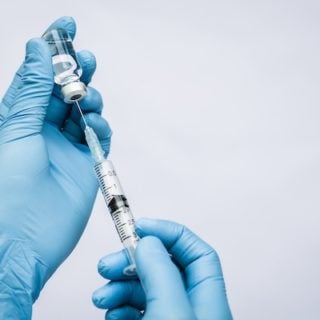
An ongoing phase II clinical trial for nivolumab (Opdivo) andipilimumab (Yervoy)shows that the two immunotherapy drugs can slow the growth of malignant pleural mesothelioma after relapse. According to early results, 44 percent of patients’ cancer did not get worse after taking nivolumab, and 50 percent of patients’ cancer did not get worse after taking nivolumab with ipilimumab.
“Our findings suggest that immunotherapy may provide new hope to patients with relapsed mesothelioma,” said lead study author Armaud Scherpereel. “This randomized phase II trialmay be enough to support the use of immune checkpoint inhibitors in this setting, but it’s too early to conclude whether nivolumab alone or the combination of nivolumab and ipilimumab is better.”
The study included 125 patients, 80 percent of whom were male, with a median age of 72 years old. All participants hadadvanced malignant pleural mesothelioma, had received zero to twomesothelioma treatmentsbefore, and were randomly assigned to receive either just nivolumab or a combination of nivolumab with ipilimumab.
Standard mesothelioma treatments include surgery, chemotherapy, and radiation therapy. Gene therapy, photodynamic therapy, andimmunotherapyare among the most promising of a number of emerging mesothelioma treatments to be developed in recent years.
Immunotherapy enhances the immune system to treat diseases. It is currently undergoingheavy research in many universities and research hospitals, not only as a potential treatment for mesothelioma but for other cancer types as well.
Immunotherapy comes in active and passive forms. Active immunotherapies stimulate the body’s own immune system to attack and kill cancer cells. Passive immunotherapies introduce synthetic immune proteins into the body to fight cancer.
在当前的研究中,大约有17%的patients who took nivolumab only saw a reduction in tumor size, while 26 percent of those who received the combination treatment had reduced tumors. With just nivolumab, it took a median time of 4 months before cancer worsened, versus 5.6 months with the combination. The median survival time for nivolumab-only patients was 10.4 months, whereas more than 50 percent are still alive for the combination treatment, making it impossible to determine themedian survival timeat this point.
To date, this is the largest clinical trial testing the effects ofimmune checkpoint inhibitorson mesothelioma. Thyroid problems, colon inflammation, and skin rash were the most common side effects observed during the study.
According to Dr. Scherpereel, “Mesothelioma cells build a protective tumor microenvironment to shield themselves against the immune system’s attacks and even act against anti-tumor immune response. Therefore, therapies that shift tumor microenvironment from a state of immune suppression to one of immune activation may hold promise in malignant pleural mesothelioma.”





